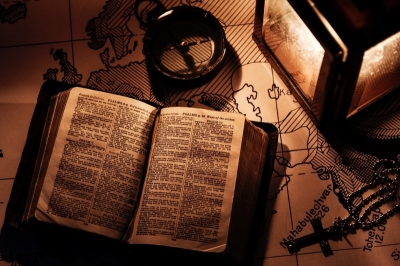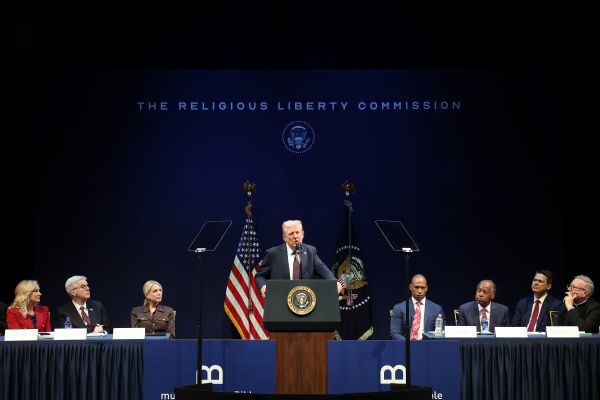The Jewish Messiah didn’t start a new religion

Scripture reveals the history of God creating, calling, leading and rescuing his people. The Bible consists of 66 books by 40 writers over a period of 1,500 years. Think of biblical history as a centuries-long bus ride which began when God created Adam and Eve as the first drivers of the “Bible Bus.” (See my CP op-ed titled, “When Did God Create Adam and Eve?”)
Adam and Eve were given specific instructions, (Genesis 2:15-17) but they decided to steer off course and crashed the bus into a tree (Genesis 3:1-24). Nevertheless, God enabled the Bible Bus to continue the journey in a world suddenly marked by sin, guilt, pain and suffering.
When Adam and Eve’s descendants chose to pursue their penchant for depravity, (Genesis 6:1-7) God decided to swap the bus with a boat for the next leg of the journey. God sheltered eight people and a boatload of animals on a sea vessel during a massive deluge.
When it was Abraham’s turn to drive the bus, God promised to make him the father of many nations (Genesis 12:2; 17:5). Moses was chosen to drive the Bible Bus when it was time to lead the Israelites out of Egypt (Exodus 14:1-31) and hand-deliver the Ten Commandments to them (Exodus 20:1-21). Abraham and Moses, of course, were far less important than the coming Messiah (Daniel 7:13-14; Isaiah 53:1-12).
The Jewish Messiah, whose Hebrew name is “Yeshua,” was born in Bethlehem as prophesied in Micah 5:2. God arranged for his people to be transferred onto a larger bus with plenty of seating for both Jews and Gentiles. The first bus represents the old covenant God made with his people in the Old Testament, while the second bus represents the new covenant of which Jesus Christ is the mediator (Hebrews 9:15). Jesus said, “For the Law was given through Moses; grace and truth came through Jesus Christ” (John 1:17).
Under the old covenant, God promised to protect and bless his people in the land they were entering if they obeyed the commandments of the Lord (Deuteronomy 30:15-18). The New Covenant, on the other hand, involves God’s free gift of everlasting life (John 3:16; Romans 6:23) for every Jew and Gentile who accepts Christ’s sacrifice on the cross as the payment for their sins. (See my 2014 CP op-ed titled, “When Your Jewish Family Member Meets Yeshua.”)
When "celebrating the Passover with his disciples" (Matthew 26:18) and instituting the Lord’s Supper, Jesus said: “This cup is the new covenant in my blood” (Luke 22:20). Yeshua’s Bible Bus was right on schedule as the Jewish Messiah was preparing to go to the cross to be sacrificed for our sins and then rise from the dead on the third day. (Isaiah 53:1-12; Hebrews 10:1-18; 1 Peter 3:18; 1 Corinthians 15:3-8).
Many Jews and Gentiles today seem to think Moses is still driving the Bible Bus, and that he is able to transport passengers all the way to Heaven. They wrongly assume they can earn eternal life by trying to obey the Law. People in Jesus’ day held the same misguided opinion.
While speaking to some religious Jews one day, Jesus said: “Do not think I will accuse you before the Father. Your accuser is Moses, on whom your hopes are set. If you believed Moses, you would believe me, for he wrote about me. But since you do not believe what he wrote, how are you going to believe what I say?” (John 5:45-47).
The authors of the New Testament were Jewish, with the possible exception of Luke. The Bible is essentially a Jewish book written by Jewish authors who were inspired by God (2 Peter 1:21; 2 Timothy 3:16) to write down the salvation history of the Jewish people and the Jewish Messiah. The Gospel message is “the power of God for the salvation of everyone who believes; first for the Jew, then for the Gentile” (Romans 1:16).
The Jews in Jesus' day who accepted Yeshua as Messiah made the successful transfer from the Bible Bus that Moses once drove to the Bible Bus that Yeshua began driving at the beginning of his earthly ministry. This was not a new religion, but rather, a new and better covenant, a new and better bus, and a new and better bus driver.
Shammai was a leading Jewish scholar who lived during the 1st century. He said, “Make study of the Torah your primary pursuit.” The Torah refers to the five books of Moses (Genesis, Exodus, Leviticus, Numbers, and Deuteronomy). Sadly, many people fail to journey with God beyond Moses and the Torah. They never make the necessary transition to Yeshua. Those who read the Torah religiously and then reject Yeshua as Messiah are like those who devour premarital counseling books and then refuse to get married.
Studying both the Old Testament and the New Testament remains a pivotal practice for followers of Yeshua today. Thankfully, Jesus fulfilled the Law perfectly for us and was offered as a sinless sacrifice of atonement for our transgressions. You see, “The Law was put in charge to lead us to Christ” (Galatians 3:24). The Law shows us our sin, and the Gospel reveals the good news of salvation through faith in Yeshua.
Jesus explained to some Jews one day why reading the Torah and the Old Testament prophets did not remove their need to have a personal relationship with the Messiah. Jesus said, “You diligently study the Scriptures because you think that by them you possess eternal life. These are the Scriptures that testify about me, yet you refuse to come to me to have life” (John 5:39-40).
Are you seeking salvation through obedience to God’s Law, or by relying upon Yeshua's sacrifice on the cross as the payment for your sins? Moses, like Abraham before him, is unable to wash away even one of your sins. If you place your trust in Yeshua, however, He will remove your transgressions and deliver your soul from the eternal penalty for sin.
You can speak to Jesus right now from your heart.
“Dear Lord, I have sinned against your perfect Law, but I turn away from my sins today. Wash me, Jesus, with your precious blood. I believe you died for my sins on the cross and rose from the dead on the third day. Fill me with the Holy Spirit to live for you every day. In Jesus’ name. Amen.”
Dan Delzell is the pastor of Redeemer Lutheran Church in Papillion, Nebraska.





















